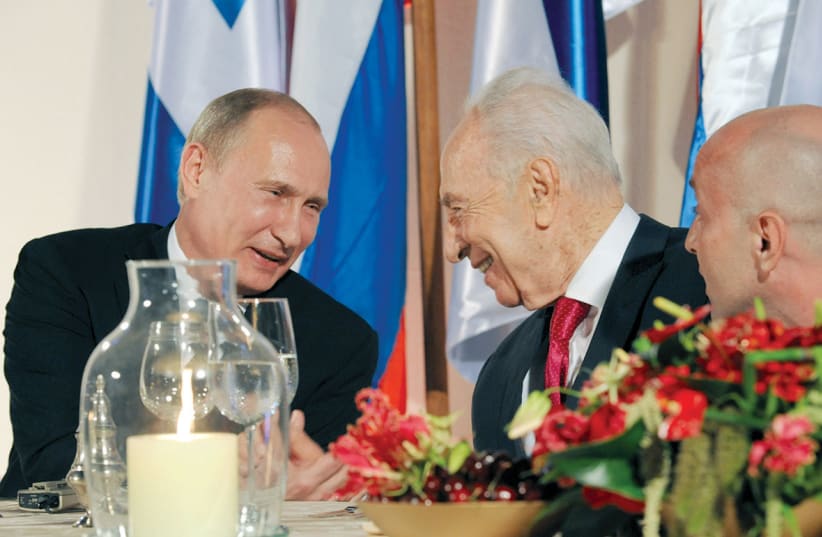Russian President Vladimir Putin’s invasion of Ukraine on February 24 triggered a powerful memory of his one-day visit to Israel a decade ago, on June 25, 2012, when then-president Shimon Peres hosted him for a banquet in Jerusalem. I was invited to the dinner as editor of The Jerusalem Post, but Peres’s political adviser, Yoram Dori, was privy to the pre-dinner tête-à-tête between the two men. Here for the first time is his fascinating account of the meeting, which provides a keen insight into the way Putin’s mind works. Dori also suggests a surprise lesson at the end for the Russian strongman himself.
Dori: President Putin came to Israel to inaugurate a memorial in Netanya called the Victory Monument for the Red Army soldiers who were killed fighting the Nazis in World War II. During the visit, he met President Peres at his residence, a meeting in which I participated. The discussion between the two men dealt, inter alia, with the situation in Syria, where President Assad’s regime was on the verge of collapse. In those days, we witnessed the first sparks of Russian support for the Syrian dictator, whose demise many Israelis wished to see. Peres asked Putin not to prevent the fall of Assad’s bloody regime. Putin, with a wry smile, began an honest monologue, and I remember his words (translated from Russian) vividly:
Putin: Diplomacy is like chess, at which my people and your people are the best in the world. In chess, you need to look ahead several moves and prepare for alternative outcomes. The Americans want us to topple Assad? No problem; we share the same views about his regime. But look what happened to America in Iraq and Libya. Bush toppled Saddam without thinking ahead, and the result was the establishment of a pro-Iranian Shi’ite regime in Iraq. Obama toppled Gaddafi, handing Libya over to a militia that posed a danger not only to the Libyan people but also their neighbors – Morocco, Algeria and Tunisia. If they had acted like [Russian chess champions] Spassky or Botvinnik, this would never have happened.
Dori: I remembered this conversation because I imagined sitting opposite Putin again, reminding him of his words a decade ago and suggesting that he act like Russian grandmaster Anatoly Karpov (I wouldn’t mention the Jewish grandmaster Garry Kasparov, the most vocal opponent of Putin’s regime) and think very carefully about the day after. The world of 2022 is not the world of the 20th century. A Russian puppet regime in Ukraine can fall just as the Russian puppet regime (and the American one) fell in Afghanistan. I would turn to him and declare, “Let’s say, President Putin, that you succeed in conquering Ukraine. Would you prefer a violent regime led by Ukrainian gangs (and believe me, as a Jew, I know what Ukrainian violence is) targeting everything Russian on their land? One more thing I’ve learned as a chess kibitzer: Often the illusion of an advantage on one side ends up with a checkmate by the other. One piece of advice from the late Peres, who understood the difference between diplomacy and chess, and that people are very different from pieces on a chessboard. Peres once quipped, “We’ve prepared an outstanding war plan, but unfortunately the enemy isn’t cooperating.” One final comment: the main topic of the conversation between Putin and Peres was Iran’s nuclear program, which is still a major concern. The last 10 years have flown by like the blink of an eye, and it’s a pity – and a tragedy – that Putin seems to have forgotten his own advice.
